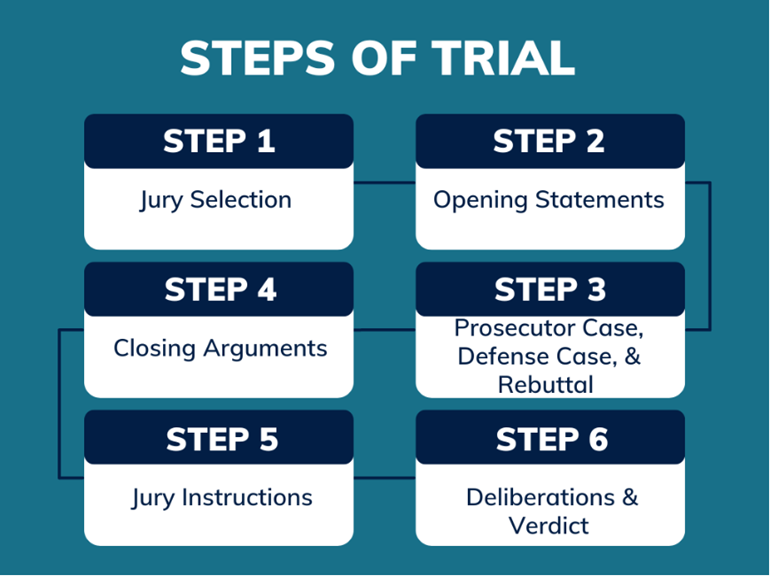The criminal justice process - Trial

Trials occur before a Judge (bench trial) or a Judge and Jury (jury trial). The Prosecutor and Defense attorney present evidence and question witnesses. The prosecutor has the burden to prove the case beyond a reasonable doubt.
At the end, the Judge or the Jury finds the defendant "guilty" or "not guilty". If the jury cannot agree on a verdict the Judge will declare a “hung jury” and the State will consider whether to retry the case. There are several phases of a trial outlined below:

-
Jury Selection
Once a case has been assigned to a judge, and pre-trial motions have concluded, the judge will facilitate jury selection, also called voir dire. This is when a panel of jurors will be summoned to appear for court. Each juror will be provided a number and they will participate in questioning from the judge, the prosecution and defense. Jury selection will conclude with 12 jurors and usually a couple alternates.
-
Opening Statements
When jury selection is complete, the state will, and the defense may present their opening statements to the jury. During opening statements, attorneys outline their case by presenting an overview of the facts and witnesses they intend to call during trial.
-
The prosecutor's case, the defense's case, and rebuttal
The State has the burden to prove their case by beyond a reasonable doubt and will present its case first. The state will call witnesses one at a time to present evidence to the jury. Witnesses may include:
- Victims
- Individuals who saw or have information related to the case,
- First responders like medics,
- Law enforcement,
- Medical professionals, and
- Other related experts.
The prosecution will contact each witness in advance of trial and communicate expectations and logistics for the time and day of testimony. It is important to know that once trial begins:
- There can be unexpected continuances, delays or changes to the schedule.
- Witnesses may be expected to be present on a specific day and time.
After the State has called all its witnesses, the State will rest, and the defense may call witnesses. Both the defense and the prosecution can cross examine or ask questions of the opposing side’s witnesses.
During trial, attorneys may make objections that may require additional arguments outside of the jury’s presence and before the judge. These arguments may have to do with case law, evidence rules, or previous pre-trial rulings.
After the defense rests, the State may call rebuttal witnesses. When testimony is complete the attorneys will present closing arguments.
-
Closing arguments
Closing Argument is the final opportunity for each side to summarize their strongest case before the jury. The attorneys will remind the jury of the evidence and facts that they presented at trial and provide legal argument regarding the defendant’s guilt or innocence.
-
Jury instructions
Before the jury begins deliberations, the Judge will provide them with a set of instructions to help them understand the law and what is expected from them during deliberations.
-
Deliberations and verdict
The jury instructions will guide the jury’s deliberations until they have reached a decision or “verdict”.
Upon receipt of the verdict, the court will notify both the prosecutor and defense attorneys. Court will resume within 30 minutes to 1 hour depending how quickly the parties return to court.
The verdict will be read out loud in court. There are three possible verdicts, with a unique outcome:
- "Guilty" – The defendant is convicted, and the court will schedule a sentencing hearing a few weeks out.
- "Not guilty" – The jury decides that the case was not proven beyond a reasonable doubt and the defendant is released.
- "Hung jury" – The jury unable to unanimously agree on the defendant’s guilt or innocence, and the case may be re-tried.
Watch the video: Criminal Justice Process: Pre-Trial and Trial
Crime Victims
Trial looks different for every case. But generally, you and other witnesses will be in contact with the prosecuting attorney, or your advocate if one is assigned. They will let you know the day you need to
appear and the day you will be expected to testify. Once you testify, most of your participation in the trial is complete. For more information check out our tips for coming to court.

 Translate
Translate